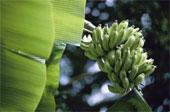Banana trade resists global economic slowdown
Though low on priority list, the innocuous looking banana is among the few agricultural items that seem to have resisted the impact of global financial crisis more than other farm commodities.
A recent United Nation’s Food and Agriculture Organisation (FAO) report predicts banana imports to decline slightly to 13.8 million tonne in 2009, about 3.3% less than 2007.
Banana imports by the European Union, the US and other developed countries fell by 4.1%, 5.5% and 3.2%, respectively. On the other hand, developing countries would continue to register an increase in demand for the fruit with imports predicted to rise 2.5% to 2.33 million tonne, driven largely by China.
If the recession bottoms out by the end of 2009, then the demand for bananas would increase by up to 7.8% and that for tropical fruits by about 2% in 2010, FAO said. The fruit is expected to resist recession because it is deemed by consumers to be a necessity and is less sensitive to changes in income and price. Also, the share of household income that is expended on the fruit’s purchase is small.
“With steady growth in populations and income, and rising awareness about the positive nutritional value of fruits, global banana and tropical fruit consumption is likely to continue its upward trend in the next few decades” the FAO report said.
The combined trade in banana and tropical fruit now accounts for nearly 40% of the global fruit market.
Though bananas are believed to have been among a few agriculture crops that resisted the impact of global recession, the FAO has also called for creating a global map of banana and plantain diseases, warning that the cumulative production damage caused by diseases could mount to over $4 billion by 2010.
Banana Bunchy Top Disease and Banana Bacterial Wilt threaten the food security of 70 million people in 15 countries of sub-Saharan Africa who depend on bananas for their livelihood and food supply.





